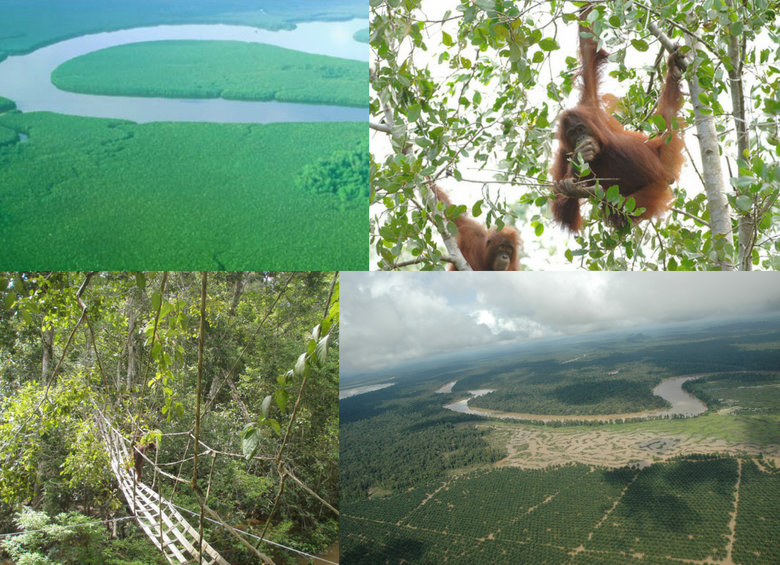Since its foundation in 1952, Saraya has developed and sold hand hygiene products that display high cleaning efficiency, prevent skin irritation and are highly biodegradable. As the first company in Japan to use plant-based resources in the manufacturing of dish detergent, Saraya has been known throughout Japan as the natural choice in hygiene and sanitation products. The company has always complied with OECD regulations, which state that OECD products must include at least 60 % of highly biodegradable ingredients. Saraya currently provides health and hygiene solutions for household care, medical infection prevention, food preparation hygiene, and public hygiene. Each market segment is a key element in expanding its use of sustainable innovations.
The Issue
Malaysia is a major source of Saraya’s palm oil and palm kernel oil, and the state of Sabah on the island of Borneo, Malaysia is part of the area’s largest and oldest rainforests. The development of palm plantations in Borneo is a major threat to elephants, orangutans and other iconic local wildlife. Because of Saraya’s relationship to the supply chain, in 2004 it began working towards directly reducing the environmental burden of it products.
Challenges and How Saraya Takes Responsibility
• Develop and distribute products that have a reduced impact on the environment.
• Maximize the use of key raw materials that function favourably with the environment and initiatives that foster biodiversity preservation, such as active participation in the Roundtable on Sustainable Palm Oil (RSPO) and committing to use RSPO certified palm oil.
• Support NPOs, NGOs and local organization activities that promote sustainable development of palm oil plantations in harmony with biodiversity preservation needs.
• Communicate environmental issues to stakeholders.
• Promote sustainable industrial, healthcare and food hygiene approaches as well as sustainable lifestyles to consumers.
The Response
Saraya joined the Round Table of Sustainable Palm Oil (RSPO) in 2004. As an early member, Saraya proposed the addition of creating a Green Corridor along the Kinabatangan River into the criteria for sustainable palm oil and the longterm goals of the RSPO. The proposal was not ratified. In response, however, Saraya organized three symposiums in Japan to promote the use of sustainable palm oil in Japan. The company has also concentrated its efforts into a more organized project with long-term goals to establish the Borneo Conservation Trust (BCT). The BCT’s goal is to secure a green corridor along the Kinabatangan River that will allow wildlife to traverse the island while avoiding human civilization and plantations as they move from one wildlife preserve to the next. This should allow for coexistence and the successful continuation of Borneo’s rich diversity. Regarding further nature conservation actions, Saraya began working with the Sabah Wildlife Department to provide assistance to young elephants that have been injured by snare traps set for small game. Saraya donates one percent of its palm based detergent sales to the BCT, and President Yusuke Saraya serves as a board trustee. A chapter of the BCT also functions out of Japan, to bring awareness to Japanese consumers and educate the people on how the BCT is working to facilitate preserving biodiversity. Some of the projects include collecting used fire hoses to create bridges for orangutans in the Borneo jungle to cross rivers and also sponsoring consumers to visit Borneo and bring back knowledge and awareness to spread throughout Japan. Half of the financial funds used to support the Borneo Conservation Trust come from Saraya, and BCT’s Japan office is located at Tokyo Saraya. These facts reflect how much the BCT relies on Saraya’s support and its importance to the long-term goals of the company. The land secured by the BCT’s green corridor project has been extended by 30 hectares. Saraya owns naming rights to 10 hectares. There is an abundant reserve of funds to purchase more land in Borneo for when the proper kind of land can be located.
The Results
In May 2012, Saraya released its first RSPO certified oil based products, only two years after the certification process began. Saraya has made further innovations and valued added products with sustainable palm oil. By using a unique fermentation process of segregated” certified palm oil, Saraya developed Soforo, a highly biodegradable and effective detergent for households. WWF evaluated Saraya and gave it the highest possible score on the Palm Oil Buyers Scorecard in 2011. This scorecard measures the performance of 132 major retailers and consumer goods manufacturers in 4 separate areas to determine just how responsibly these companies act. Saraya is an active participant in biodiversity preservation through its membership in the RSPO and the innovative use of RSPO certified palm oil within the chemical manufacturing industry in Japan. Other companies have followed suit in this field, but the food industry, which consumes four times more palm oil than the chemical manufacturing industry, has not taken any action on behalf of biodiversity preservation thus far. Another concern is that out of the annual 47 million tons of palm oil produced worldwide, only 4.72 million tons (as of July 2011) were RSPO certified. Moreover, the demand for palm oil in recent years has tended to surpass the supply, which has reduced the level of stock available and is putting pressure now more than ever on biodiversity in palm oil plantation areas. But rather than low production of RSPO certified palm oil, the main issue is low demand for such oil, and the situation has not improved substantially. Saraya understands that educating consumers and bringing them on site to raise awareness about the need for biodiversity preservation is vital.




